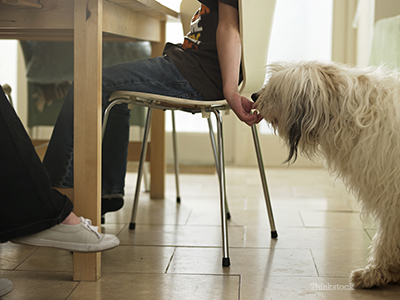Nobody wants to deprive themselves or their pets of life’s little enjoyments. Certainly when I am watching my calories, I try to find solace in the knowledge that someday I will have another piece of fried chicken or another candy bar. I just can’t eat them every day, and I certainly can’t eat three at a time. I use my decidedly un-carrot like understanding of future treats as my proverbial carrot-on-a-stick to keep me on course; however, the key is that at some point I will get that favorite snack again as my reward.
Likewise food rewards are an important part of our relationships with our pets. We use treats not only for training our dogs and cats but also for bonding with them. We feed them, they love us. We feed them special things, they love us even more. Certainly I’ve always counseled my clients that it is okay to give their pets small bits of people food. I would be a hypocrite if I didn’t. After all, I have one cat that loves papayas and another that adores saltine crackers. There’s no way I would know their favorites if I didn’t occasionally offer them food from my plate, hence the old adage -- ‘anything in moderation.’ As long as I don’t overdo treats and risk upsetting the wholesome balance of their finely-crafted, commercially-prepared diet I won’t do them any harm, and we all get a warm, fuzzy feeling.
When not to feed your pet special treats
There are, of course, a few important considerations with this approach. First, there are certain foods that can be toxic to our pets even in small amounts: seemingly healthy things like onions, garlic, raisins, and grapes. Secondly, there are certain medical conditions that influence what is or is not healthy or safe for your pet. For instance, dogs prone to pancreatitis should steer away from fatty treats. Diabetic animals need always be careful and consistent with what they eat. Animals with irregular bowel habits may need the appropriate type and/or amount of fiber in their diets. You should always check with your veterinary professional and research individual foods before you introduce them into your pet’s diet.
What to watch out for if you feed your pet special treats
So what about just a wee bit of white meat turkey at Thanksgiving? What about just a tiny piece of candy at Halloween? Or a bit of a candy cane at Christmas? Certainly none of those things are fatal indulgences. The problem arises, however, when you aren’t looking and Fido and Fluffy start making their own portion control choices. And you and I know it will happen.

Over the years, I have seen many, many dogs that got into luggage or tore open lovely, gift-wrapped boxes to gleefully gorge on the expensive Godiva. I knew a dog once that ate an entire tray of intricate, homemade lollipops: colorful wrappers, ribbons and sticks included (and believe me, that does not look nearly as festive coming back up again). I even knew a dog that stole a kabob at a barbeque and swallowed the skewer along with the steak. Then there was the one poor dog that presented at the clinic in mid-December uncomfortable and in pain. The pain seemed to be in his lower back so we ran some tests. Imagine our surprise when the XRays revealed a mass of bones in his colon. Upon further questioning it turned out that on Thanksgiving Day, when everyone woke up from their post-turkey nap, they noticed the turkey carcass was gone. I don’t know if they thought it walked off on its own or if they thought helpful, holiday fairies had taken it away. But we found it weeks later inside that poor dog.
Always be on your guard when your pet is around people food
Hopefully those folks learned their lesson about leaving their dog to temptation. I hope so because that is our responsibility: to keep our pets safe from themselves. They aren’t people. They don’t reason like people. They aren’t like my brother-in-law who ate so many chocolate chip cookies once when he was a child that to this day, decades later, he still can’t even stomach the thought of eating another one. No, our pets don’t necessarily make these associations. No matter how much we’d like to think they’d learned not to chase cars once one hit them or that vomiting up candy canes would teach them not to eat candy canes, they are just as likely to engage in their bad behaviors the next time opportunity comes knocking.
We have to be the ones to learn. So as we head into this season of holidays, enjoy and have fun. Put costumes or reindeer antlers on your pets. Include them in your celebrations. But be careful about what you feed them and also remember to remain vigilant about what they feed themselves.
If you have any questions or concerns, you should always visit or call your veterinarian -- they are your best resource to ensure the health and well-being of your pets.
The opinions and views expressed in this post are those of the author's and do not necessarily represent the beliefs, policies or positions of PetHealthNetwork.com, IDEXX Laboratories, Inc. or its affiliates and partner companies.
